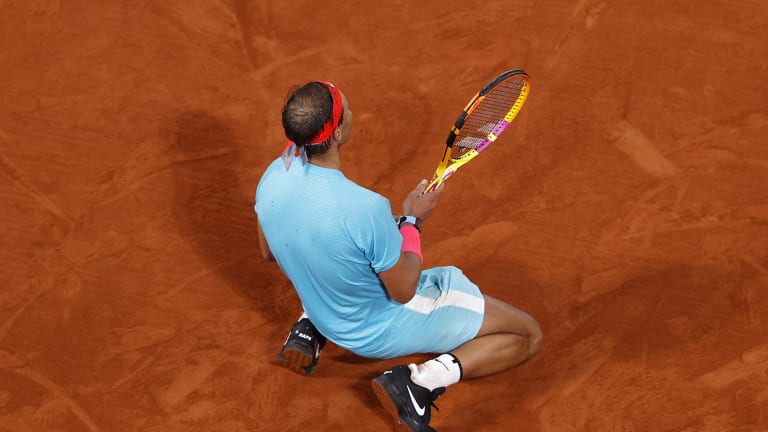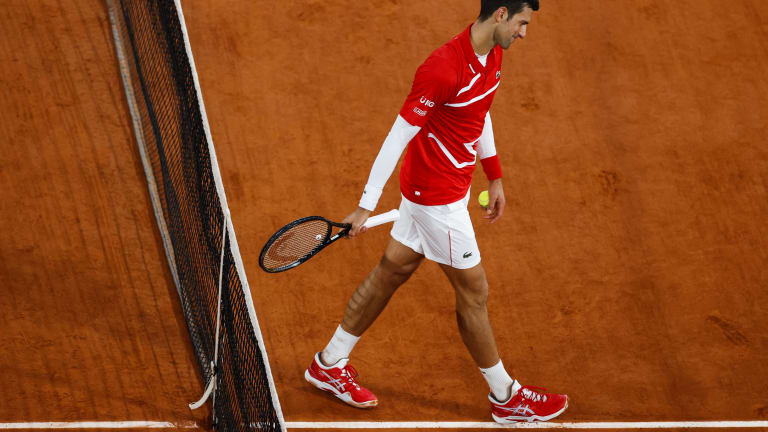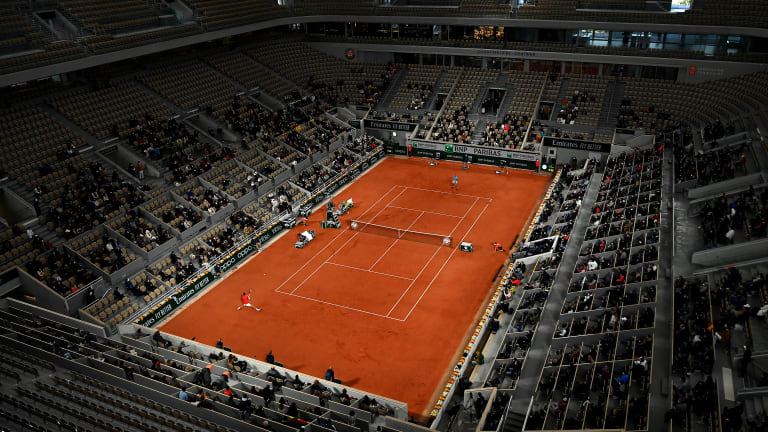In one of his finest final wins, Rafael Nadal dominates Novak Djokovic
By Steve Flink Oct 12, 2020Rafael Nadal to be honored with 'exceptional' tribute on opening day of Roland Garros
By Associated Press Apr 17, 2025French Open organizers introduce draw to access ticket sales
By Associated Press Jan 07, 2025Coaches Corner: Juan Carlos Ferrero proves essential to Carlos Alcaraz's Roland Garros success
By Steve Tignor Jun 14, 2024What’s next for Novak and Nadal? Four ATP storylines after the Paris fortnight
By Joel Drucker Jun 10, 2024Naomi’s resurgence, Iga on grass: Four WTA storylines after the Paris fortnight
By Joel Drucker Jun 10, 2024Carlos Alcaraz becomes the clay-court champion that he—and we—always knew was possible
By Steve Tignor Jun 09, 2024Coco Gauff wins first Grand Slam doubles title with Katerina Siniakova in dream team debut
By Matt Fitzgerald Jun 09, 2024Coco Gauff is a Grand Slam champion in singles and doubles, exceeding her own expectations
By Associated Press Jun 09, 2024From Rafa to Iga: as one owner of Roland Garros departs, a new one has moved in
By Steve Tignor Jun 08, 2024In one of his finest final wins, Rafael Nadal dominates Novak Djokovic
Rafa handily defeated a discombobulated Nole, 6-0, 6-2, 7-5 to claim his 13th French Open and at long last tie Roger Federer’s record of 20 Grand Slam singles titles.
Published Oct 12, 2020
Advertising
All through his storied career as one of the greatest players in tennis history, Rafael Nadal has defined his character as an indefatigable competitor with an oversized heart, a limitless supply of ambition and an unmistakable sense of fair play. He has always gone out into his workplace and performed honorably, winning and losing with equanimity, fighting with quiet fury, respecting his rivals, and never developing an inflated view of himself or his capacities. He examines his own accolades with extreme humility. Above all else, he has been an exemplary sportsman. He has made tennis a better place just by showing up.
After he had handily defeated a discombobulated Novak Djokovic 6-0, 6-2, 7-5 to claim his 13th French Open and at long last tie Roger Federer’s record of 20 Grand Slam singles titles, Nadal spoke to the sparse Parisian audience with customary class and sensitivity. He realized that his latest title run there was inspirational to his many fans and even casual sports observers who have long appreciated the Spaniard’s unique charms, but also fully understood that his renowned opponent had endured a terrible day at the office. Moreover, Nadal did not want to ignore the hard fact that the world at large has been severely diminished during an almost unimaginable pandemic.
“First of all, congrats to Novak for another great tournament. Sorry for today,” said Nadal with obvious sincerity. “In Australia [last year] he killed me. Today was for me. That is part of the game. We have played plenty of times together. One day someone wins and another day it is the other. So all the best for the future, Novak.”
WATCH: Nadal's championship speech
In one of his finest final wins, Rafael Nadal dominates Novak Djokovic
Advertising
Then, after thanking his family and his team for their crucial contributions to his cause, Nadal turned his attention to the plight of people across the planet.
“At the same time I want to send a message to everyone around the world. We are facing one of the worst moments that we remember in this world, fighting against this virus. So keep going, stay positive, and all the very best. We will go through this and we will win against the virus soon.”
Those comments were as well received by the audience as the performance Nadal had just given against a desultory Djokovic. It was indeed reminiscent of Djokovic’s 6-3, 6-2, 6-3 destruction of Nadal in the 2019 Australian Open final. On that occasion, Djokovic had affirmed his hard-court superiority with one of the most masterful displays of his career against an off-form Nadal.
This time around, Nadal was magnificent from the outset. It was one of the finest matches he has played in his entire career. He had come into the tournament with disgruntlement about the heavier balls and the colder autumn air, believing both hindered him considerably as he launched another campaign for the world’s premier clay-court title.
But by the time he took on Djokovic in one of the most important matches of their respective careers, Nadal had come to terms with the different conditions and he looked entirely at ease. His heavy topspin forehand was not bounding as high, but he did not drop a single set over the course of the fortnight. It was not vintage Nadal leading up to the final, but then again he was not that far from his zenith in dismantling six opponents.

In one of his finest final wins, Rafael Nadal dominates Novak Djokovic
© Getty Images
Advertising
Getty Images
The opening game set the entire tone for the match. Taking two points with the backhand drop shot that was his trademark all tournament long, Djokovic moved ahead 40-15. But then he netted a drop shot. Nadal followed with a scintillating backhand crosscourt winner. The Spaniard took the next two points with outstanding defense, and had the immediate break.
Djokovic made a bid to break back for 1-1, recovering from 40-15 down to deuce. But Nadal was once more better on the biggest points as Djokovic netted a backhand drop shot and drove a two-hander inches long. It was 2-0 for Nadal. A listless Djokovic double faulted to fall behind 15-40 in the third game, and Nadal pounced. He broke at 30 for a 3-0 lead with a deep forehand crosscourt return provoking an error from Djokovic off the backhand. So often in the past ten years, the Djokovic two-hander has neutralized the famed Nadal forehand, but not so on this occasion. Nadal’s forehand was humming.
In the fourth game, Djokovic made a concerted effort to get back into the set. He had three break points, but Nadal erased them all dynamically with a forehand inside in winner, a heavy forehand looped deep to draw an error, and a scorching backhand crosscourt winner. After three deuces, an unwavering Nadal surged to 4-0 with a ace down the T.
Djokovic led 40-0 in the fifth game but was denied again by a man who plays every point like a match point. The Serbian double faulted at 40-0, and after three deuces Nadal earned a third break of serve with an impeccably struck backhand crosscourt winner. Serving for the set at 5-0, 40-15, Nadal wrapped it up neatly with an ace out wide. For only the second time in his career, he had taken a 6-0 set from Djokovic. It had never happened in their previous 15 meetings at the majors.

In one of his finest final wins, Rafael Nadal dominates Novak Djokovic
© AFP via Getty Images
Advertising
Across that opening set, Nadal made only two unforced errors while taking an aggressive posture in the rallies. Conversely, Djokovic had 13 unforced errors and connected with only 42 percent of his first serves.
At the start of the second set, Djokovic managed a very tough hold to move in front 1-0. He had Nadal down 15-30 in the second game but bungled a second serve return off the backhand. Nadal held on, broke in the following game, and survived a tough game to hold on for 3-1.
Djokovic could find no inner spark or outer emotion. Serving in the fifth game, he double faulted for 30-40, released an ace for deuce, but then left a backhand drop shot hanging invitingly for Nadal, who chipped a backhand pass crosscourt for a winner. Djokovic then erred off the forehand. It was 4-1 for Nadal.
The Spaniard wrapped up that set 6-2, conceding only one point in his last two service games. Only once at the majors had Nadal given up a two-set lead, falling against Fabio Fognini at the 2015 US Open. His record at the Grand Slam events from that position was 218-1. Nadal was not going to let that happen on his favorite court.

In one of his finest final wins, Rafael Nadal dominates Novak Djokovic
© Getty Images
Advertising
At 2-2 in the third set, Nadal broke at love, making one forehand winner while Djokovic self-destructed on the other three points. But Djokovic pridefully broke back for 3-3 with one of his signature backhand down-the-line winners.
The 2016 Roland Garros victor looked somewhat revitalized. He was striking the ball with decidedly more velocity and conviction. He held for 4-3 after reaching 40-15 with a forehand down the line winner and then executing a nifty serve-and-volley combination.
But Nadal sensed he had to bear down hard with Djokovic gathering steam. He held on for 4-4. Down break point in the ninth game, Djokovic gambled by going for a big second serve down the T, but won that point with a crackling two-hander crosscourt. From deuce he punched a forehand volley into the open court and put away an overhead. It was 5-4 for the Serbian.
At that moment, it seemed entirely possible that Djokovic might seal that set, but Nadal was not a willing partner in that venture. Down 0-15 in the tenth game, he swept four points in a row with firm resolve. At 5-5, Djokovic double faulted at 30-40 just wide down the T, and so Nadal served for the match in the twelfth game. Calmly and resolutely, he closed it out in style, holding at love with an ace out wide to complete a 6-0, 6-2, 7-5 triumph. This inimitable left-hander raised his match record at Roland Garros to 100-2.
WATCH: Championship point
In one of his finest final wins, Rafael Nadal dominates Novak Djokovic
Advertising
Djokovic, too, affirmed that he is a fine sportsman.
“I want to say a huge congratulations to Rafa and your team and family,” the runner-up said. “What you are doing on this court—and not just this court but with your entire career—you have been a great champion. Today you showed why you are the King of the clay. I have experienced it in my own skin.
“It was a very tough match for me today. Obviously I am not pleased with the way I played but I was definitely overplayed by a better player today on the court. It has been a fantastic couple of weeks and obviously this situation is very difficult for everyone worldwide, but to have the possibility to play the sport that we love I am very grateful to everyone who made sure to actually allow us to be on the court.”
Nadal conveyed similar sentiments, and then was asked about standing on level terrain with Federer at 20 majors—and counting.
“It has been a very tough year, but winning here means everything to me,” he said. “It is not the moment honestly for me today [to think] about the 20th and equaling Roger or this great number. For me today it is just about the Roland Garros victory.
“Roland Garros means everything to me. I spent here most of the most important moments in my tennis career—no doubt. For me, just to play here is a true inspiration. and the love story that I have with this city and with this court is unforgettable.”
In time, Nadal will indeed reflect on how he has caught up with Federer in the exclusive 20-major club and try to figure out how to surpass the Swiss. That is entirely possible, because in less than eight months the Spaniard will be back to defend the title he has now captured four years running. In between he will be competing at the Australian Open, seeking his first title in Melbourne since 2009.
WATCH: Djokovic's runner-up speech
In one of his finest final wins, Rafael Nadal dominates Novak Djokovic
Advertising
Nadal’s win over Djokovic was monumental from a historical perspective. Djokovic had an opportunity to win a second French Open and thus establish himself as only the third man ever (along with Roy Emerson and Rod Laver) to collect all four major titles at least twice.
Moreover, Djokovic could have secured an 18th Grand Slam title and would then have stood only one behind Nadal and two in back of Federer. Now he trails both by three. He still leads Nadal 29-27 in their fabled career head to head series, but this loss will have lasting repercussions to be sure. Djokovic had won nine of his last ten major finals.
Nadal was remarkable on many levels. In the early stages especially, he fended off some of Djokovic’s most stinging shots and extended the rallies beautifully, provoking Djokovic to eventually miss by going for too much. His serve was first rate. He had a superb afternoon off the backhand and flattened it out skillfully to produce winners. And he managed to elevate the forehand with heavy topspin and great depth to coax errors from Djokovic on the high backhand. He was first rate across the board while Djokovic was dangerously subpar and moving poorly by his standards. Hence the decisive result.
Nadal established himself as the first man in the Open Era to capture four majors without losing a set, adding this latest win to the runs he made at Roland Garros in 2008, 2010 and 2017. He won his first major at the French Open fifteen years ago— the longest gap ever for a man in the Open Era between first and most recent triumphs. Moreover, Nadal has now taken six majors since turning 30 years of age—more than any man in the Open Era. He has moved ahead of Djokovic 5-4 in head to head major finals.
Where does Nadal go from here? How many more prestigious prizes will he amass? For now, let’s simply say that he has won at least one major in 14 of the last 16 years. He has moved beyond himself again, thoroughly confirming his enduring greatness, playing one of the best big matches of his career to oust his foremost rival.